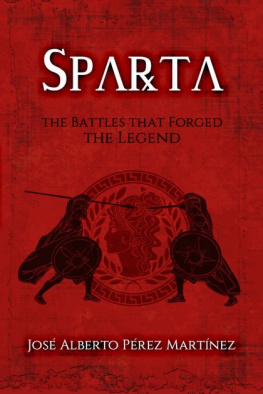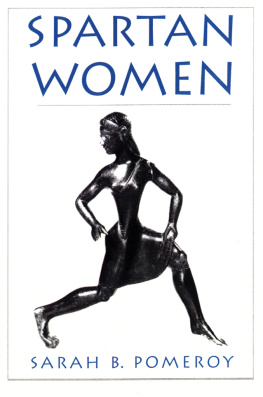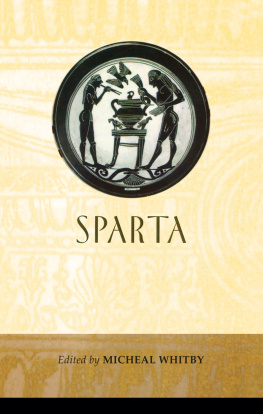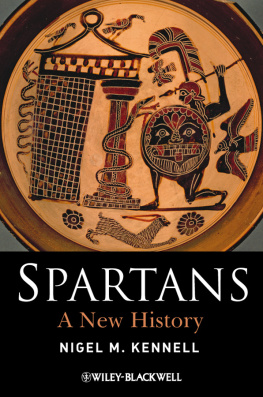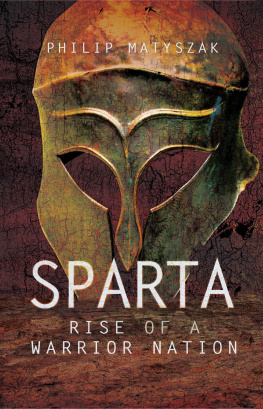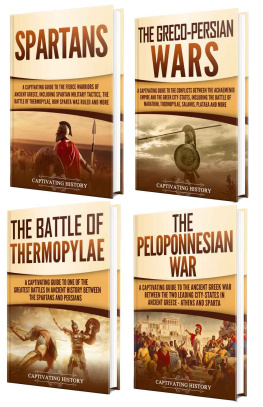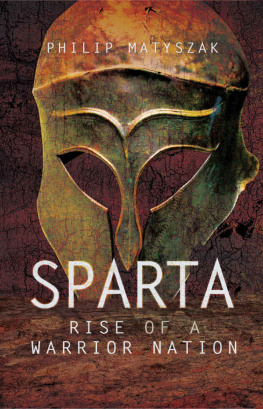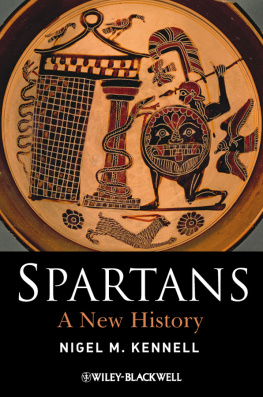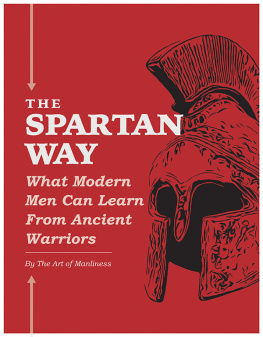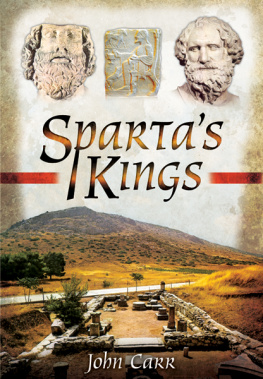
Jose Alberto Perez Martinez
Sparta:
The battles that Forged the Legend
Xpartan Editions
2014 Jose Alberto Perez Martinez
2014 Xpartan Editions
First edition, Madrid. 2014.
INDEX
ABOUT THE AUTHOR
PROLOGUE
SIXTH CENTURY
The Battle of the Champions, 545 BC
Background
The Revenge of Sparta
The Battle
Consequences
FIFTH CENTURY
The Battle of SepeIa, 494 BC
Background
The Battle
Consequences
The Battle of the Thermopylae, 480 BC
Background
The Moment of Leonidas I
The Battle
Consequences
The Battle of Plataea, 479 BC
Background
Pausanias, New Commander of Sparta and the Greeks
The Battle
Consequences
The Battle of Tanagra, 456 BC
Background
The First Peloponnesian War
The Battle
Consequences
The Battle of Amphipolis, 422 BC
Background
The Defeat of Sphacteria
A Young Man Named Brasidas
The Battle
Consequences
The Battle of Mantinea, 418 BC
Background
Sparta Takes Action
The Battle
Consequences
Battle of Sicily, 414 BC
Background
The Battle
The Arrival of Gylippus
The Outcome of the Port of Valleta
Consequences
The Battle of Notium, 406 BC
Background
The Resurgence of Sparta: Lysander and Cyrus
The Battle
Consequences
The Battle of Aegospotami, 405 BC
Background
The Battle
Consequences
FOURTH CENTURY
The Battle of Coronea, 394 BC
Background
The Battle
Consequences
EPILOGUE
BIBLIOGRAPHY
ABOUT THE AUTHOR
Jose Alberto Perez Martinez (Madrid, 1981) received a B.A. in Geography and History from the National University of Distance Education, Madrid in 2006. His research on the Spartan Army earned him a Diploma of Advanced Studies in 2012. He is currently preparing for the defense of his doctoral dissertation based on the economic and social collapse of Sparta in Fourth Century, BC.
Currently employed in Public Administration, his literary work also extends to the recent publication of his first novel Masters of the World (2014) and an essay entitled Spartans, the Men Who Forged the Legend (2014) as well as several history articles published in scientific magazines. Very involved as well in the world of the health and fitness, Mr. Perez Martinez was also named Taekwondo Champion of Madrid in 2010 and has worked as a personal trainer for ten years. In addition, he has provided collaboration for international sports blogs such as Puntofape and Efeblog, publishing more than fifty articles.
To my mother, to whom I owe all my words.
PROLOGUE
We have always heard Sparta spoken of as a military superpower of the ancient times. However, most of the works that have been written on it have been limited to describing the general aspects of the Lacedaemonian society as a whole, forgetting or, indeed, tiptoeing around the most characteristic aspect of its configuration: its militarism. The war element has occupied a limited space within the great works of the more famous Spartan Historians, being reduced to few sections in the overall context of the work. We know, thanks to these, military characteristics such as the discipline or strict education that Spartan boys were subjected to from early childhood. Nevertheless, we know only tangentially the practical applications this discipline had on the land.
That is the main reason I felt compelled to make the decision to carry out this brief compilation of battles that, either by their historical or tactical importance, serve as a basis for a more concrete understanding of the Spartan military spectrum and, by extension, the war. It is paradoxical that, for a society of such marked military character like Sparta, there has not yet been a work of this type dedicated to offering the reader the ability to access a brief synthesis of the subject, if so desired.
Making a selection, however, is never a simple task. In my previous book Spartans, the Men Behind the Legend, I explained the reasons why they, and not others, were the men chosen to shape such work. There will always be those who disagree and, on the contrary, those who believe that such compilation was quite accurate. In the case of "Sparta, the Battles Behind the Legend", I have chosen the eleven confrontations which, I believe, were the most significant for the Lacedaemonian city. Most of these took place in the 5th century BC in the context of the Peloponnesian War against Athens; but I also found it interesting to highlight two that occurred before and after this century, i.e., one from the middle of the 6th century, the Battle of "Champions", and another toward the end of the 4th century BC, the Battle of Coronea. The first, due to being the oldest of which we have obtained sufficient information as to place it in context, and describe some details about its development and implications. It is true that prior to this occurred the famous "Battle of Chains," in which the Spartans marched to fight Arcadia, bringing with them the shackles they placed on their wrists once defeated, - something that, by the way, did not take place as it was the Spartans that ended up being chained - however, the almost complete absence of facts to develop the broader context that would allow me to include the battle, forced me to exclude it. On the other hand, the battles that had taken place in 4th century BC - in addition to Coronea - were not, by and large, much more than a succession of Spartan defeats that precipitated the end of its hegemony over Greece. Perhaps this matter is more suited to an original work on the causes of the Spartan decline than for this work, no doubt oriented to extol the Lacedaemonian successes throughout much of the classical period.
On the other hand, it has been my desire for all battles to correspond to a same scheme in its development, that is, a history, whose function is to place the reader in a historical context that gives meaning to the story of the battle itself, as well as sufficient knowledge of the period in question; a battle, which conforms to the core of the narration of the confrontation itself and the consequences, that would serve to offer an overview of the results of this battle in a broader framework, both for Sparta and its opponent. However, I have been flexible with this plan, introducing specific subtitles which, in my opinion, help to create a more pleasant reading, avoiding excessively long and cumbersome texts.
The sources I have made use of have been the most basic. Not finding myself before an academic work, I believed it sufficient to use the classical works of Herodotus, Thucydides, Xenophon and Plutarch, without resorting excessively to contemporary authors. It is precisely the Classics that yield the most details regarding each event, which is why I considered them most suitable for this kind of book. Ultimately, what is before you is a work intended for the general public, whose purpose is mere entertainment and basic knowledge of an aspect that, despite its importance, has been ignored by modern authors. For this reason, I hope and trust that this is a book that appeals to the reader and serves as your "key" to a deeper understanding of the unique and exciting Spartan society.
Sagunto, 2014
6TH CENTURY
Battle of Champions, c. 545 BC
The Battle of "Champions" or "300 Champions" took place around the year 545 BC however we cannot determine the exact year. It was just one of the contests between Sparta and Argos, its rival, between the 7th and 5th centuries BC. Both cities were disputing the hegemony of the Peloponnesian peninsula since at least that time and this battle was not only Spartas first important victory over its rival, but also a change in their favor regarding the trend of dominance over the peninsula. The origin of the name is due to the presumed number of combatants used by both cities during the battle.
Next page
